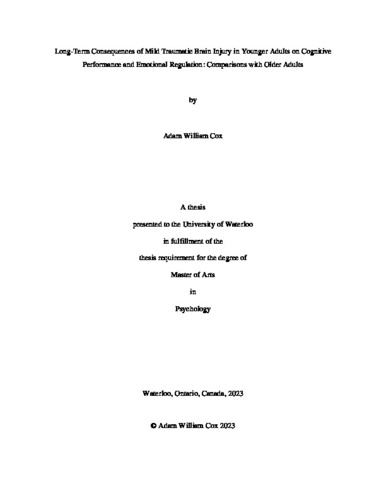| dc.description.abstract | Concussions, or mild traumatic brain injuries (mTBI), are common and seemingly innocuous. However, even long after individuals experience a mTBI they often report psychological consequences such as fatigue, unstable mood, and poor concentration. Individuals with a history of mTBI also often complain of difficulties in focusing attention, and lingering memory problems, though documenting deficits using standard neuropsychological testing typically fails to corroborate these effects. Many of their cognitive complaints are also voiced by typically aging older adults. Given this, we examined whether the cognitive signatures in aging and in those in young adults with a remote mTBI would be similar. We predicted a memory deficit relative to young adults with no mTBI history, on a recognition test for pairs of unrelated words (Associative memory) but not on an easier recognition test for individual words (Item memory) due to predicted deficits in available cognitive resources. We also predicted that deficits would be greater when encoding was done under conditions of reduced attentional resource availability, known to negatively affect older adults, and likely to exacerbate cognitive and psychological symptoms in mTBI. Data for Experiment 1 were collected in an in-person sample. Experiment 2 followed the same design, but data were collected in an online sample using crowd sourcing. Participants were asked to study pairs of unrelated words under either full or divided attention conditions. We found the expected main effect of Test Type on recognition memory, in both experiments, with Associative memory being poorer than Item memory. Moreover, we found the expected main effect of Attention with memory being poorer when encoding was done under divided attention. In terms of cognitive performance, we replicated the known ‘associative memory deficit’ in our older adult sample in Experiment 1, but not 2. We found that the drop in recognition accuracy from full to divided Attention conditions on the Associative memory test was significantly greater in mTBI compared to young controls and was like that seen in older adults. In terms of psychological measures, we found that self-reported mental fatigue increased significantly, only in the mTBI group, as performance on the Associative test under divided attention decreased. In conclusion, our findings suggest that younger adults with a remote mTBI, like older adults, have a tougher time coping when tasks increase in cognitive demand. Cognitive tasks may be experienced as more demanding in those with a mTBI group, even months after injury. | en |

